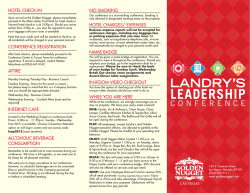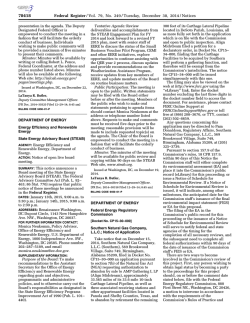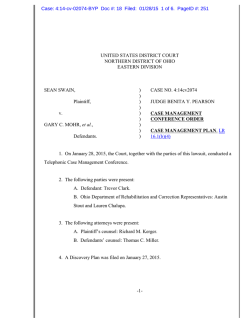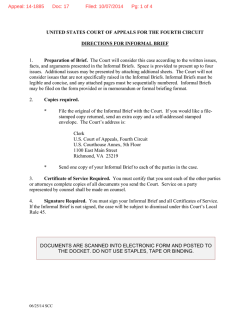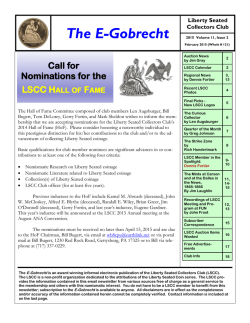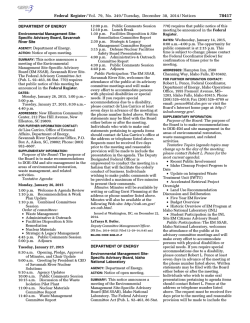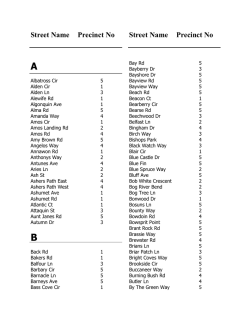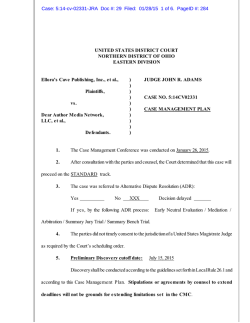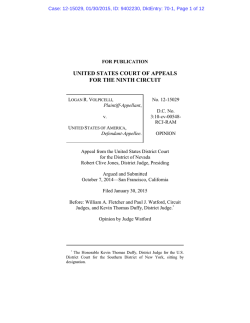
MEMORANDUM OPINION as to Dennis Carson
Carson v. USA
Doc. 1
IN THE UNITED STATES DISTRICT COURT
FOR THE DISTRICT OF DELAWARE
DENNIS D. CARSON,
Movant/Defendant,
V.
UNITED STATES OF AMERICA,
Respondent/Plaintiff.
)
)
)
)
)
)
)
)
)
)
Civ. A. No. 12-229-GMS
Cr. A. No. 06-116-GMS
MEMORANDUM OPINION
Dennis D. Carson. Pro se movant.
Jennifer K. Welsh, Assistant United States Attorney, United States Department of Justice,
Wilmington, Delaware. Attorney for respondent.
, 2015
Wilmington, Delaware
Dockets.Justia.com
I
I
I
I.
INTRODUCTION
Movant Dennis D. Carson ("Carson") filed a pro se motion to vacate, set aside, or correct
sentence pursuant to 28 U.S.C. § 2255. (D.I. 46) The government filed an answer in opposition.
(D.I. 53) For the reasons discussed, the court will deny Carson's § 2255 motion as time-barred
without holding an evidentiary hearing.
II.
BACKGROUND
In 2005, Carson filed a civil suit against Springfield College after the school dismissed
him for violating the Code of Student Conduct. (D.1. 1) In October 2006, Carson mailed a letter
to the law firm representing Springfield College; the letter contained numerous threats and
references to the Columbine shooting, and suggested that similar events might occur if
Springfield College failed to pay him $75,000, reinstate him as a student, and grant him free
tuition. See United States v. Carson, 377 F. App'x 257, 258 (3d Cir. 2010). Carson was
subsequently indicted and charged with: (1) transmitting in interstate commerce a threat to injure
the person of the another with the intent to extort money and other things of value (violating 18
U.S.C. § 875 (b)); and (2) transmitting in interstate commerce a communication containing a
threat to injure another person (violating18 U.S.C. § 875 (c)). (D.1. 5; D.I. 6)
Based on statements Carson made in his threatening letter and during an interview with
his United States Probation Officer, the government filed an unopposed motion for a competency
evaluation. (D .I. 10) Magistrate Judge Mary Pat Thynge granted the motion on October 31,
2006. (D.1. 11 ). Dr. William J. Ryan, a licensed psychologist, filed a psychiatric report on
January 16, 2007, opining that, although Carson suffers from schizoaffective disorder and other
1
mental health problems, Carson "currently does possess a rational and factual understanding of
the proceedings against him, does have the capacity to assist legal counsel in his defense, and he
can rationally make decision regarding legal strategy." (D.I. 15; D.I. 53 at 2) In February 2007,
Magistrate Judge Thynge held a competency and determined that Carson was competent to stand
trial. See (Minute Entry from 2/1/2007, stating "Competency Hearing as to Dennis D. Carson
held on 2/1/2007.")
On July 16, 2007, while under oath before this court, Carson entered a guilty plea to
count one of the indictment charging him with violating 18 U.S.C. § 875(b). (D.I. 24; D.I. 43)
During the change of plea hearing, the court conducted a thorough colloquy with Carson and his
defense counsel about Carson's mental state. (D.I. 43 at 5-10) The court found Carson to be
competent to enter a guilty plea, stating:
After having reviewed the psychologist's evaluation from the Metropolitan Correctional
Facility in New York, albeit dated some time ago, having questioned Mr. Carson, and
having discussed Mr. Carson's current level of competence with [defense counsel], in
light of the responses that I have received, the Court will find, Mr. Carson, that you are
competent and fully capable of proceeding forward today.
(D.I. 43 at 10)
On February 7, 2008, the court sentenced Carson to ten years of imprisonment, followed
by three years of supervised release. (D.I. 42) Judgment was entered on February 27, 2008.
(D.1. 35) The Third Circuit Court of Appeals affirmed Carson's conviction and sentence on
April 28, 2010. See Carson, 377 F. App'x at 259-60.
Carson filed the instant§ 2255 motion in February 2012, contending that he was not
competent to enter a guilty plea. (D.1. 46) The government filed an answer asserting that the
motion should be denied as time-barred or, alternatively, as meritless. (D.1. 53)
2
III.
DISCUSSION
The Antiterrorism and Effective Death Penalty Act of 1996 ("AEDP A") imposes a one-
year period of limitation on the filing of a§ 2255 motion by federal prisoners. See 28 U.S.C. §
2255. The one-year limitations period begins to run from the latest of:
(1) the date on which the judgment of conviction becomes final;
(2) the date on which the impediment to making a motion created by governmental action
in violation of the Constitution or laws of the United States is removed, if the movant was
prevented from making a motion by such governmental action;
(3) the date on which the right asserted was initially recognized by the Supreme Court, if
that right has been newly recognized by the Supreme Court and made retroactively
applicable to cases on collateral review; or
(4) the date on which the facts supporting the claim or claims presented could have been
discovered through the exercise of due diligence.
28 U.S.C. § 2255(f). The one-year limitations period is subject to equitable tolling. See Holland
v. Florida, 560 U.S. 631, 645-46 (2010)(equitable tolling applies in§ 2254 proceedings); Miller
v. New Jersey State Dep 't of Corr., 145 F .3d 616, 619 n.1 (3d Cir. 1998)(holding that the oneyear limitations period set forth in§ 2255 is not a jurisdictional bar and is thus subject to
equitable tolling).
Carson does not allege, and the court cannot discern, any facts triggering the application
of§§ 2255(f)(2), (3), or (4). Therefore, the one-year period oflimitations began to run when
Carson's conviction became final under§ 2255(f)(l).
A federal prisoner's conviction becomes final for§ 2255 purposes when certiorari is
denied or upon the expiration of the ninety-day time period for filing a petition for certiorari.
See Clay v. United States, 537 U.S. 522 (2003). The Third Circuit Court of appeals affirmed
3
Carson's conviction and sentence on April 28, 2010, and he did not file a petition for writ of
certiorari. As such, Carson's judgment of conviction became final on July 27, 2010, meaning
that he had to file his§ 2255 motion by July 27, 2011. See Wilson v. Beard, 426 F.3d 653 (3d
Cir. 2005)(holding that former Federal Rule of Civil Procedure 6(a), (e) applies to federal habeas
petitions).
Carson did not file the instant§ 2255 motion until February 16, 2012, 1 approximately
seven months after the expiration of the limitations period. Although Carson asserts that he did
not timely file his § 2255 motion because he did not know there was a statute of limitations, (D.I.
46 at 12), his ignorance of the law and lack of legal expertise does not excuse his failure to make
a prompt and timely filing. See Jones v. Morton, 195 F.3d 153, 160 (3d Cir. 1999); Simpson v.
Snyder, 2002 WL 1000094, at *3 (D. Del. May 14, 2002)(a petitioner's lack of legal knowledge
does not constitute an extraordinary circumstance for equitable tolling purposes) In turn, Carson
does not assert, and the court does not discern, any other reason to excuse his untimely filing
under the equitable tolling doctrine. Accordingly, the court will deny the instant§ 2255 motion
as time-barred.2
IV.
EVIDENTIARY HEARING
A district court is not required to hold an evidentiary hearing on a motion filed pursuant
to 28 U.S.C. § 2255 if the "motion and the files and records of the case conclusively show" that
1
Pursuant to the prisoner mailbox rule, the court adopts February 16, 2012 as the filing
date, because that is the date on Carson's§ 2255 motion. See Longenette v. Krusing, 322 F.3d
758, 761 (3d Cir. 2003).
2
Having determined that the instant motion is time-barred, the court will not address the
government's alternate reason for dismissing the motion.
4
the movant is not entitled to relief. 28 U.S.C. § 2255; see also United States v. Booth, 432 F.3d
542, 545-46 (3d Cir. 2005); Rule 8(a), 28 U.S.C. foll. § 2255. As previously discussed, the
record conclusively demonstrates that the instant motion is time-barred. Accordingly, the court
concludes that an evidentiary hearing is not warranted.
V.
CERTIFICATE OF APPEALABILITY
A district court issuing a final order denying a§ 2255 motion must also decide whether to
issue a certificate of appealability. See 3d Cir. L.A.R. 22.2 (2011 ). A certificate of appealability
is appropriate only if the movant "has made a substantial showing of the denial of a
constitutional right." 28 U.S.C. § 2253(c)(2). The movant must "demonstrate that reasonable
jurists would find the district court's assessment of the constitutional claims debatable or
wrong." Slackv. McDaniel, 529 U.S. 473, 484 (2000).
The court is denying Carson's§ 2255 motion as time-barred, and is persuaded that
reasonable jurists would not find this assessment debatable. Therefore, the court will not issue a
certificate of appealability.
VI.
CONCLUSION
The court concludes that Carson is not entitled to relief pursuant to 28 U.S.C. § 2255.
An appropriate order will issue.
5
© Copyright 2026
